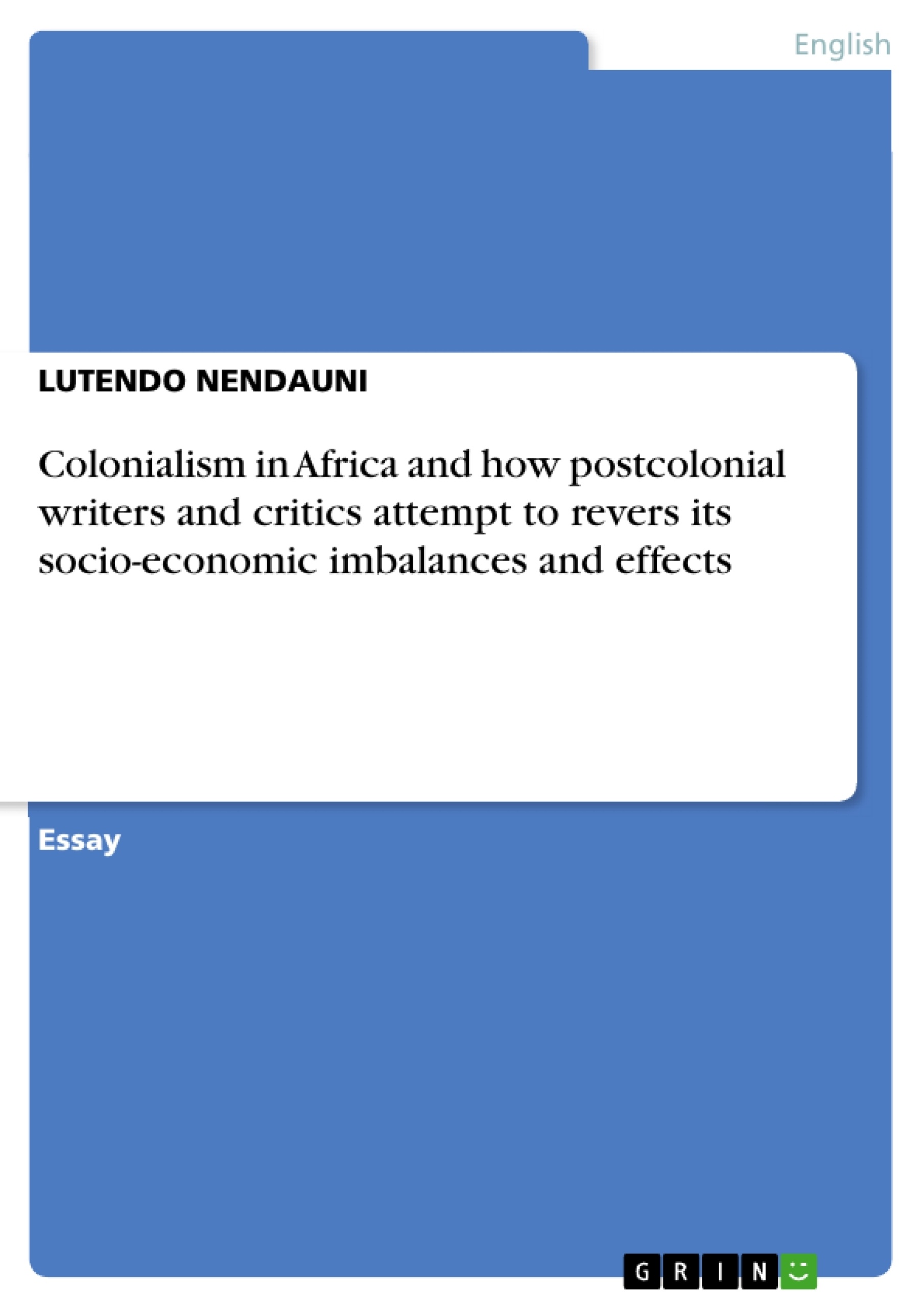This essay details how colonialism unfolds in Africa and how post colonial writers and critics try to reverse the socio-economic imbalances and other resulting effects.
Inhaltsverzeichnis (Table of Contents)
- INTRODUCTION
- THE PROCESS OF COLONIALISM
- POSTCOLONIAL TERMS
- THE EFFECTS OF COLONIALISM
- POSTCOLONIAL WRITERS AND CRITICS
- CONCLUSION
Zielsetzung und Themenschwerpunkte (Objectives and Key Themes)
This essay explores the impact of colonialism on Africa and the attempts of postcolonial writers and critics to counter its socio-economic and cultural effects. It examines the historical processes of colonization, the cultural and economic exploitation that resulted, and the various strategies employed by postcolonial writers to resist and reclaim their identities.
- The process of colonialism in Africa and its impact on social, economic, political, and cultural life
- Postcolonial terms like transculturation and displacement and their relevance to understanding the colonial experience
- The effects of colonialism on African identity, cultural traditions, and perceptions
- The strategies used by postcolonial writers and critics to challenge colonial narratives and reclaim African agency
- The role of language and cultural expression in resisting colonial influence
Zusammenfassung der Kapitel (Chapter Summaries)
- INTRODUCTION: This section defines colonialism as cultural and economic exploitation and outlines the essay's focus on exploring the colonial experience in Africa and how postcolonial writers attempt to reverse its impact.
- THE PROCESS OF COLONIALISM: This chapter details the historical process of colonialism in Africa, highlighting its motives, which were primarily based on economic exploitation of the continent's resources. It examines the negative effects of colonial policies on African societies, including social, cultural, and political distortions.
- POSTCOLONIAL TERMS: This section introduces key postcolonial concepts such as transculturation and displacement. Transculturation refers to the reciprocal influence of cultures between colonizers and colonized, while displacement addresses the feelings of alienation and loss experienced by colonized peoples.
- THE EFFECTS OF COLONIALISM: This chapter explores the multifaceted effects of colonialism on Africans, covering physical displacement through slavery, psychological trauma, and cultural displacement due to the forced adoption of Western traditions. It also discusses the impact of colonialism on African identity and perceptions.
- POSTCOLONIAL WRITERS AND CRITICS: This chapter examines the strategies used by postcolonial writers and critics to resist the effects of colonialism. It highlights their efforts to challenge colonial narratives, reclaim African identities, and assert their own voices. Examples from various works of literature, music, and theatre are used to illustrate these strategies.
Schlüsselwörter (Keywords)
Key terms and concepts that underpin this essay include colonialism, postcolonialism, transculturation, displacement, cultural exploitation, economic exploitation, African identity, postcolonial literature, counter-discourse, language, and cultural expression.
Frequently Asked Questions
What is the main focus of this essay on colonialism?
The essay explores the process and effects of colonialism in Africa and how postcolonial writers attempt to reverse its socio-economic imbalances.
What does the term "transculturation" mean?
Transculturation refers to the reciprocal cultural influence and exchange between the colonizers and the colonized peoples.
How did colonialism affect African identity?
It led to physical and psychological displacement, cultural trauma, and the forced adoption of Western traditions, causing a loss of indigenous identity.
What strategies do postcolonial writers use to resist colonial effects?
They use counter-discourse, reclaim African languages, and challenge colonial narratives to assert their own cultural agency and history.
What was the primary motive behind the colonization of Africa?
The primary motive was economic exploitation, specifically the extraction of Africa's vast natural resources for the benefit of European powers.
- Arbeit zitieren
- mr LUTENDO NENDAUNI (Autor:in), 2016, Colonialism in Africa and how postcolonial writers and critics attempt to revers its socio-economic imbalances and effects, München, GRIN Verlag, https://www.grin.com/document/345368



